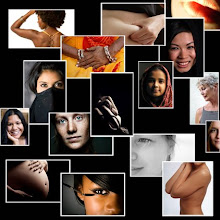"I don't think you understand," I cried to my Mom. "I feel about my skin the way anorexics and bulimics feel about their bodies. Only I kind of envy them because at least they can do something about their weight. There is nothing I can do to make my skin clear up." Later in the conversation, I told her she was a bad mother for not being ashamed to be seen with me in public. Logically, I knew I was talking crazy, but my rational mind obviously was not in charge at the moment. I was throwing a temper tantrum because I wanted my acne to go away, and some achingly young part of me expected that my Mom could fix everything. She was baffled and protested that she thought I was fine, that she had not taught me about makeup and hairstyles because she thought I wasn't interested. I expected her to observe me close enough to know that this apparent disinterest was just clever camouflage. I was pretending I didn't care because it was the only way I could deal with hating my looks so much. Now I know that she was so afraid that insisting I wash my face or wear foundation would give me a complex of some kind that she erred by moving to the opposite extreme, leaving me without any information or support.
People with acne are invisible in our culture in a way that even overweight people are not. Plus size models are now depicted in ads alongside skinny ones, but you won't find any zits in popular culture. I take that back, there are exactly two places acne can be seen on TV: 1) ads for Proactiv, Clearasil and other acne products, and 2) in a comedy when a girl gets one zit the night before the prom and it's a huge tragedy. (Usually, when the camera zooms in on her face, the zit is practically invisible.) In fact, now may be the worst time in history to have bad skin. Because of Photoshop and airbrushing, we’re bombarded with images of perfect skin that is unachievable even for people without persistent breakouts. These Photoshop face fixes look natural and are even harder to spot than the waist-whittling seen so often on magazine covers and in catalogs. Even though our current vogue for thinness feels eternal and ubiquitous, there have been historical periods and cultures that encouraged weight gain and viewed plumpness as a sign of beauty (as well as relative wealth and privilege). On the other hand, clear skin is so central and universal in beauty standards that there is no culture in the world that has ever seen pocked, inflamed skin as attractive. Our reaction to seeing a pimple-covered face is visceral revulsion. This is an ingrained, evolved response that helped our ancestors avoid disease. Nowadays, we automatically think zits make someone look careless, unclean and immature. It's a stereotype without a name or an -ism.
Read more...
People with acne are invisible in our culture in a way that even overweight people are not. Plus size models are now depicted in ads alongside skinny ones, but you won't find any zits in popular culture. I take that back, there are exactly two places acne can be seen on TV: 1) ads for Proactiv, Clearasil and other acne products, and 2) in a comedy when a girl gets one zit the night before the prom and it's a huge tragedy. (Usually, when the camera zooms in on her face, the zit is practically invisible.) In fact, now may be the worst time in history to have bad skin. Because of Photoshop and airbrushing, we’re bombarded with images of perfect skin that is unachievable even for people without persistent breakouts. These Photoshop face fixes look natural and are even harder to spot than the waist-whittling seen so often on magazine covers and in catalogs. Even though our current vogue for thinness feels eternal and ubiquitous, there have been historical periods and cultures that encouraged weight gain and viewed plumpness as a sign of beauty (as well as relative wealth and privilege). On the other hand, clear skin is so central and universal in beauty standards that there is no culture in the world that has ever seen pocked, inflamed skin as attractive. Our reaction to seeing a pimple-covered face is visceral revulsion. This is an ingrained, evolved response that helped our ancestors avoid disease. Nowadays, we automatically think zits make someone look careless, unclean and immature. It's a stereotype without a name or an -ism.
Read more...



